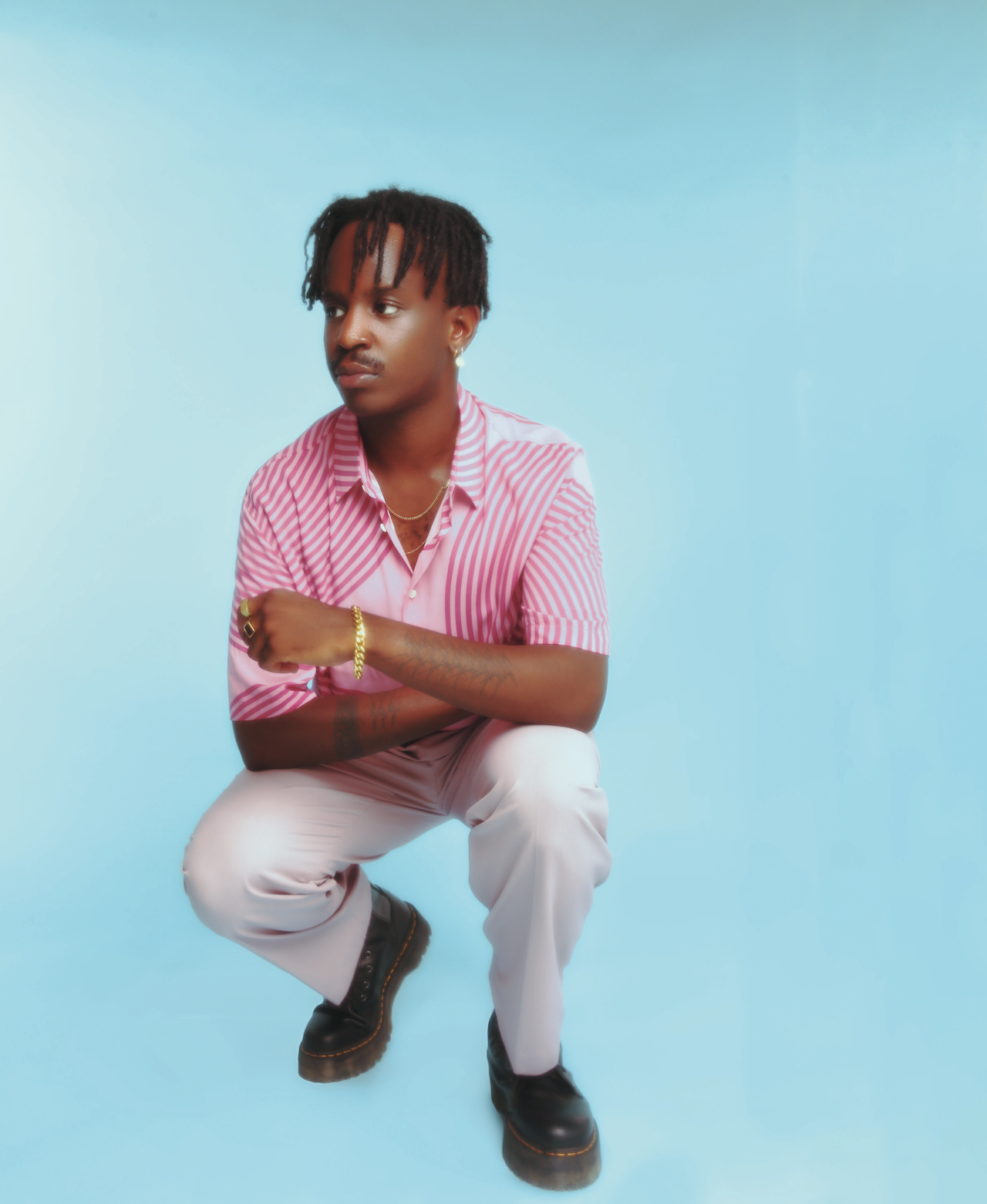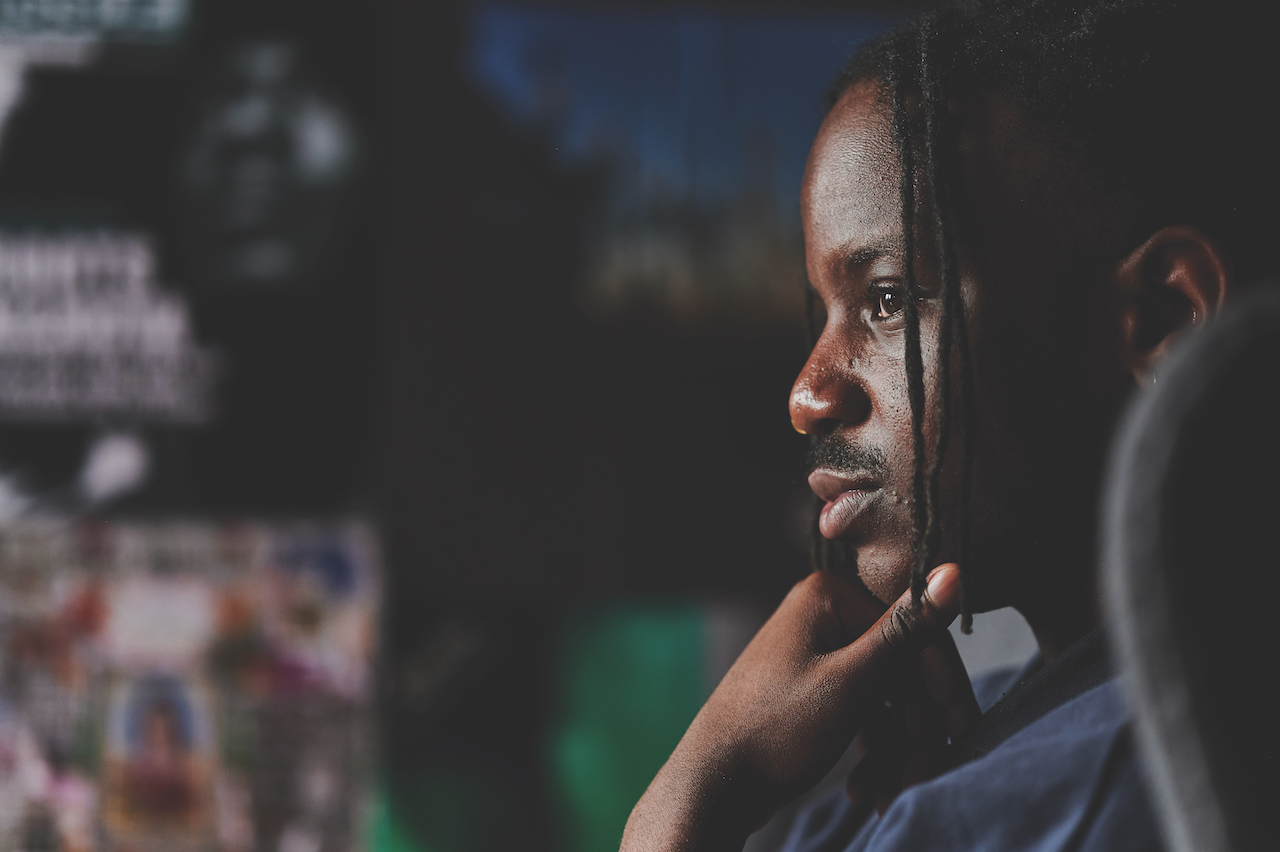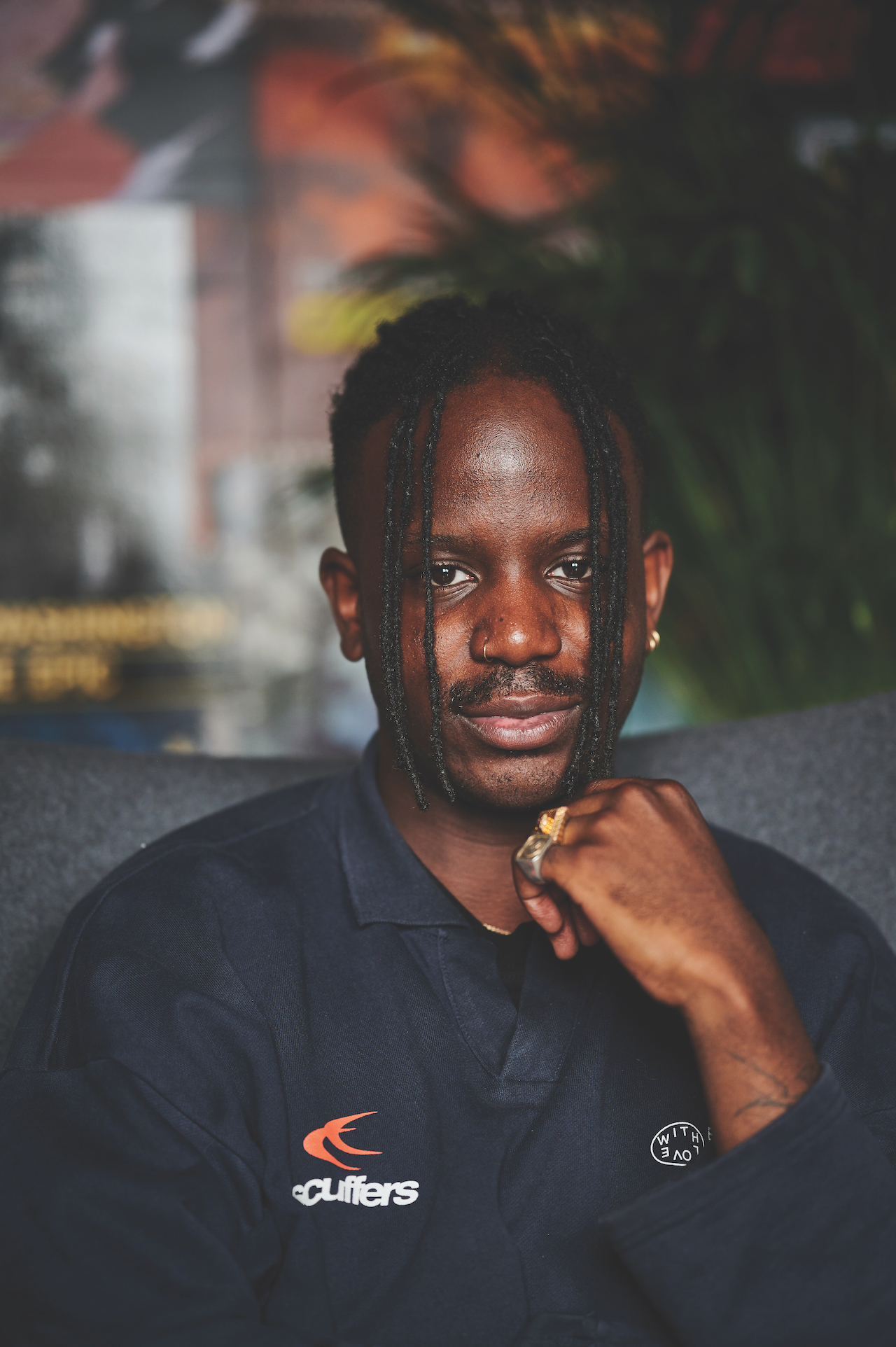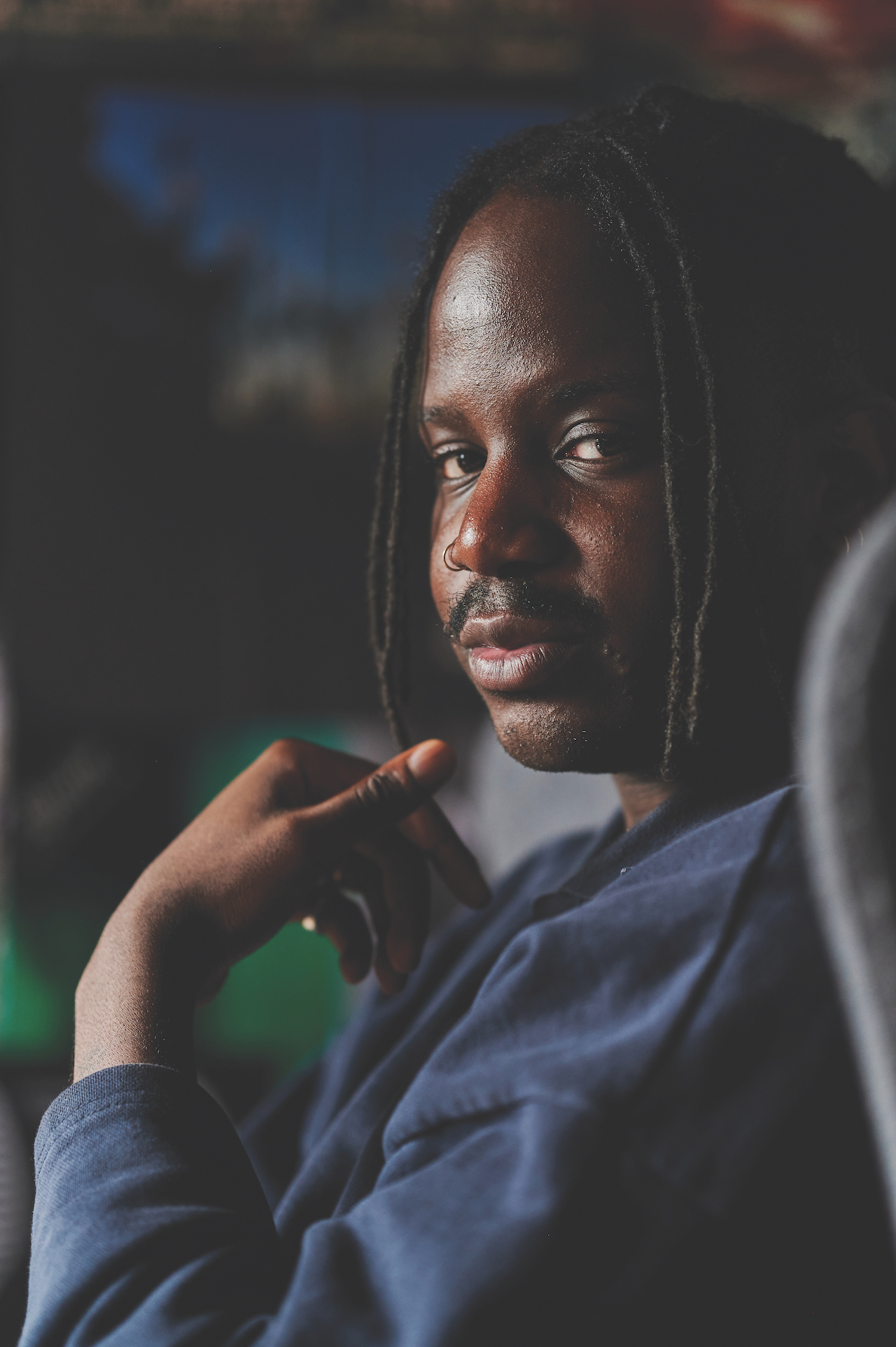“I like to do a lot of micro-sampling, which is obviously super French housey, typical of Daft Punk and Justice”: salute on the inspiration behind their debut album TRUE MAGIC
The Ninja Tune artist talks about balancing influences from pop and classic house, and the creative process behind their new project

Fast-rising DJ and producer Felix Nyajo – aka salute – was born in Vienna, and developed their love of music based on influences from their family, video game soundtracks and delving into the archives of YouTube. They started making tracks on a cracked copy of FL Studio, experimenting with a variety of sounds and genres.
It’s when Nyajo moved to the UK that their sound as salute solidified though. Initially living in Brighton, before settling in their current home of Manchester, exposure to the city’s club scene and creative bonds formed with a host of other local artists helped form salute’s distinctive take on house music, which channels elements of soul, French touch and a healthy dose of pop songwriting.
All these influences come together on salute’s debut album, TRUE MAGIC, released last month on Ninja Tune. The collaboration-heavy record features contributions from the likes of Rina Sawayama, Disclosure, Empress Of and Nyajo’s close collaborator Karma Kid.
We sat down with salute in Ninja Tune’s London HQ to talk TRUE MAGIC, DJing and how hunting for samples can taint your ability to listen to music.
How did you first get started making electronic music?
“I got into dance music at quite a young age – I think I would have been maybe nine years old – just from hearing house music on the radio. I didn’t really know that it was house music, I just knew I liked it. Then eventually, from listening to a lot of game soundtracks and doing a lot of YouTube digging, I found out about drum & bass and dubstep and grime. I think I was taking an interest in it just because I found it so strange that people could make music that sounded like that.
“I think I literally just like YouTubed, ‘how to make drum & bass” when I was like 12, and from there I figured out that you needed production software. So I pirated a copy of FL Studio onto my parents’ computer, found some really bad Vengeance samples and just kind of started from there. I didn’t know what I was doing. I had some basic musical education in the form of piano lessons a few years prior to that, so I had an ear for melody. I didn’t really think anything of it though; it was just a fun thing to do after school.
Get the MusicRadar Newsletter
Want all the hottest music and gear news, reviews, deals, features and more, direct to your inbox? Sign up here.
“I was a drum & bass producer for the first five or six years. And then I started listening to a lot of James Blake and SBTRKT and stuff around 2013, and fell into the whole post-dubstep thing. I was also making instrumental hip-hop at one point. I decided I needed a sort of side project to do the non drum & bass stuff, which is how salute came to be. Originally, as salute I was making very J Dilla and Knxwledge-influenced, samply hip-hop, post-dubstep and a bit of future bass stuff. I kind of wanted to try everything. Eventually though, everything led back to house music. That was maybe six or seven years ago.”

Where and when was TRUE MAGIC made?
“I usually make my music from home. The second bedroom in my flat is my studio. I spent a lot of 2022 touring, so I didn’t have loads of time to make music. If I’m travelling, the most I can sort of do is sample chopping and sample digging. I’ll make little 16-bar loops or whatever, and just save them and not worry too much about the production. For the start of the record, in the winter a bunch of friends of mine and I rented this big house in the countryside in Kent. We went there with a couple of synths, our speakers, headphones, laptops, guitars, and just ended up developing a bunch of these loops that I had accumulated over the last year.
It was a really fun way to approach production because previously I had just made all my music 100% by myself
“It was a really fun way to approach production because previously I had just made all my music 100% by myself. There might have occasionally been a songwriter involved or singer, but apart from that the production was always done by myself. I thought this would be a really nice opportunity to work with close friends again. I live in Manchester, and a lot of them don’t anymore, so we don’t make as much music together. It was just a really fun way to work on it.
“For the first bit, we did a writing camp in Kent, brought all our stuff and stayed out there for a week. Then my friend who makes music as Karma Kid, he has a studio here in London, so we went there and developed some of these ideas. We got some songwriters in over the summer, we booked a different house in Kent, worked on music there for a week again.
“Then towards the end of the year, we had a few weeks of very intensively wrapping up the production – the last 10%. That was the hardest bit by far, because in the first writing camps it was more about getting all our creative ideas out there, not worrying too much about how stuff sounded. Technically we were going to worry about that later, any ideas that we had we just let them flow. That was a really fun way to approach it.”
The TRUE MAGIC artwork has quite a striking visual aesthetic, as well as a few narrative references that can be found running through the album – when did all of those first come together?
“The current visual aesthetic that I’ve gone for is a lead on from what I’ve been into before, I’ve just got more means to develop it into something more tangible. I’ve always been really into the ‘80s race car aesthetic. It’s something that stemmed from my obsession with adverts, especially old sort of ‘80s and ‘90s Japanese and American adverts.
“I found out about all these really cool and very vibrant car adverts they used to have. I used to edit them to old songs of mine, put them on Instagram. Creating the world around that, within the album has been really fun. It wasn’t something I did on purpose, but after I wrapped up the album there was a clear theme running through it.”
There seems to be an obvious influence from classic ‘French touch’ house acts in your music – does that inform your choice of gear and synth sounds?
“It’s not even necessarily the sounds, it’s more the techniques that I use. I like to do a lot of micro-sampling, which is obviously super French housey, typical of Daft Punk and Justice; very classic, very emblematic of that time. I think that’s probably one of the reasons that the music sounds the way it does – I use a lot of the same sampling techniques and it comes from things like bit crushers, and finding really good compressors.
“I think a lot of the music from then feels that way because of how heavily it was compressed and how much it was distorted. It’s about pushing that kind of stuff to the limit and making sure it hits in that way. I think that, more than anything, is why music sounds the way it does. I think that era of dance music is definitely one that has influenced this album quite a lot.”

What kinds of sources do you tend to draw samples from?
“I’ve always really been into sample-based music. Back in my days of producing hip-hop, I took a lot of inspiration from J Dilla and Knxwledge and stuff. Finding out where they sampled stuff from opened my world to a whole lot of new music I hadn’t heard before. I listen to a lot of ‘80s soul.
“Most of the stuff I sample is actually just music I listened to anyway. I’m a massive fan of funk and jazz fusion and soul and R&B from the ‘70s and ‘80s. I spend a lot of time digging through archive channels on YouTube. But I also go to record stores and find stuff there, particularly when I’m sampling stuff like jazz fusion. Whenever I go over to Japan I’ll spend hundreds of pounds on records there because I can’t find them anywhere else.”
Does being on the hunt for samples affect the way you listen to and enjoy music?
“I was actually having this conversation with a friend of mine. It does become a bit more difficult after a while to just listen to music for the sake of listening to music. Especially when it’s old music that sounds really nice and warm. You be like, ‘Oh I could use this in a track’. Sometimes it’s nice to just be able to switch off. But it does mean that I’m always on high alert. I’ll be in a restaurant and something will be playing over the speakers, and I’ll be like, ‘I’m sampling that!’.
“I would say that the way I approach sampling is more focused on what the palette of sound being used is. The reason that I love the ‘80s so much is because that’s when synths were starting to be used in R&B and soul and stuff. You would have these really glossy, very dreamy soundscapes. That Quiet Storm genre of soul and R&B really appeals to me. So I think it’s more about the sound palette rather than any sort of thematic tied to the album.”
Are you still using FL Studio?
You can have amazing gear, but if the energy in the room isn’t correct, the person singing isn’t going to come out of their shell to sing
“I moved on from FL Studio when I was about 20 years old. That was to do with the first iteration of my live show. I realised that for the live show it would probably be wise to use Ableton, so I switched. Initially I was going to use Ableton just for live and produce in FL Studio, but I fell in love with the Ableton workflow so much, especially because I do a lot of sampling and at the time Ableton was far superior to any other production software for audio manipulation. I still use Ableton now. I think using Ableton has helped me to figure out really interesting ways to manipulate audio.”
Collaboration obviously plays a major role in your creative output. Do you have a set approach for working with other artists?
“In the past I’ve done a lot of remote work, where it’s often been a case of, I’ll send them some references and give them the sort of idea of what it is I want, and they’ll usually come up with something amazing. I mean, the people I work with are just the most incredibly talented people anyway. But what I really enjoyed for this album was that I was in the studio for the majority of sessions, which means that we were able to bounce off each other, we were able to develop ideas more succinctly.

“I think you get the best performance out of a vocalist if you’re in the room with them, as you’re able to be like, ‘Oh, maybe retake that’, or ‘put more emphasis on that’. Especially with Karma Kid, who also exec-produced the album with me, he’s really good at doing that kind of stuff and getting really good performances out of people. I think that’s something you would struggle with more if you weren’t doing this session in person.”
Is there a secret to capturing a good performance from a vocalist?
“It has to be the right environment, I think. You can have amazing gear, but if the energy in the room isn’t correct, the person singing isn’t going to come out of their shell to sing. You need to make the person feel comfortable. Going into sessions, I like to not start writing straightaway or start recording straightaway.
“I’ll usually spend a couple of hours just sitting with the artist, having a conversation, just spending a few hours not actually making any music until the person is super comfortable. Making sure the person is warmed up, making sure the energy is high. If it’s too long into the day, the person might start feeling tired. It’s just these small things that actually make the biggest difference. On a very basic level, those are the things that will make a really good performance.”
You mentioned the final stretch of the album being the hardest, was it a struggle to work out at what point the record was finally finished?
“I think you never really know when something is completely finished, you just become sick of working on it. I think that was the case with me and this album. Even though I had a great time working on the album, the last month or so was hell, because even though I loved all these tracks, there was always one little thing that I’m not completely happy with. I got to the end and I was like, if I listen to this anymore, I’m gonna hate it. It’s done now, and I think I’m happy with where it’s at.
“But having other people as a sounding board has been really good because it’s made me realise that I don’t need to overdo it, you get to a certain point and you’re only fiddling with, you know, a couple of dB on a hi-hat, which is just unnecessary. Having other people be like, ‘This sounds fine, stop’, is really helpful. I think I probably would have spent another two years working on the album otherwise.”
How involved were you in the final mix of the album?
“I mixed the record with James Reynolds, he’s an amazing mix engineer who I’ve worked with before in the past. Some of the mixing was done remotely and some was done in person with him. I just think that you know, especially because there’s so many vocal features on the album, having someone who’s had so much experience doing big vocal records was really good.
“It taught me a lot about vocal production as well. It definitely sped up the process because, I’ll be the first to say, mixing vocals is absolutely not my strong suit. It was really nice having someone to tie up that last bit. I mix as I go, so I’ll always get the tracks to sound as good as possible before I bounce them out and mix the stems with an engineer.”
Although TRUE MAGIC is a dance album, there’s an obvious pop influence to a lot of your tracks, is that something that comes naturally to you?
“I’ve always been really into pop music, and I think that’s just because of my upbringing. My parents listened to a lot of soul and funk and gospel, as well as my older brother, he loved R&B and house music. So it felt natural. My favourite songs are big pop songs, really. It’s not really something I’ve ever properly considered, but I never shied away from writing pop music, as it were. I think there’s a bit of a stigma, although that stigma is not as as heavy as it once was, around pop as a dirty word. I don’t think that at all, I think good pop-influenced dance music is amazing. That’s always been a part of my sonic identity.”

Are we correct in thinking you briefly studied music production, but didn’t finish the course?
“I went to uni to do music production and sound engineering, but kind of realised that I wanted to focus more on creativity and being an artist. I spent the first year of uni not at uni at all. I went to Brighton uni and I was in London all the time. I was coming up and doing sessions and going to club nights and stuff. That tickled my fancy more, so I dropped out. I think that was a good decision.”
Would you say honing your craft as a songwriter is more important than technical production knowledge?
“I think both things are really important. But I think first and foremost, especially as a young producer, the thing you should be focusing on is just getting your creativity out there. Not focusing too much on the technical aspect. Personally, I’d rather listen to a song that’s super well written and comes from the heart and that feels original, over something that’s technically amazing, but kind of dry creatively.
“There’s an innocence that you have when you first start out as a producer. You often don’t know what you’re doing so you’re just doing whatever feels right. That innocence fades after a while. The more you become accustomed to your production software, the more you become accomplished as a songwriter and a producer, I think you start to think more in terms of building blocks.
“It’s not necessarily a bad thing, but you lose a little bit of innocence. That’s one thing I envy about people who’ve just started producing – they’re just going into it with very little knowledge, and I think that’s something that you should treasure.”
Do your impulses as a songwriter inform the way you approach DJing?
“When it comes to DJing, I feel there are a few different versions of me. I can play a classic house set with loads of big breakdowns or whatever, but then I can also play quite a techno set, I think my DJing is more about giving context to the stuff I release. That’s why, when I’m given the space to, I play so much old French house and I go classic records, or even like faster hard house stuff, because all of that stuff influences the music I make now.”
In the past about you’ve advocated for inclusivity riders, mandating a mix of female, non-white and LGBTQ+ artists on any line-up you play. Those are aimed at the DJ sphere, but do you think there are similar barriers to inclusivity in production?
“One reason why some people might struggle to get into it is time. If you’re working a job that requires you to be super active, or if you just don’t have the time to write music, or you don’t have enough money to buy, you know, music production software or hardware, then those are already barriers, you know. The vast majority of people in the music industry that are able to make a living already came from backgrounds that enabled them to have the time to write music.
“If you’re lucky enough to have parents who can give you money, and you don’t have to worry about, you know, earning money on the side to make it work, that’s already such a privilege. So I think the bottom line is that, you know, a lot of people just don’t have the time or the space or the money to do it.”
TRUE MAGIC is out now on NinjaTune – to download or order – as well as find tour dates – visit salute's website.


I'm the Managing Editor of Music Technology at MusicRadar and former Editor-in-Chief of Future Music, Computer Music and Electronic Musician. I've been messing around with music tech in various forms for over two decades. I've also spent the last 10 years forgetting how to play guitar. Find me in the chillout room at raves complaining that it's past my bedtime.













